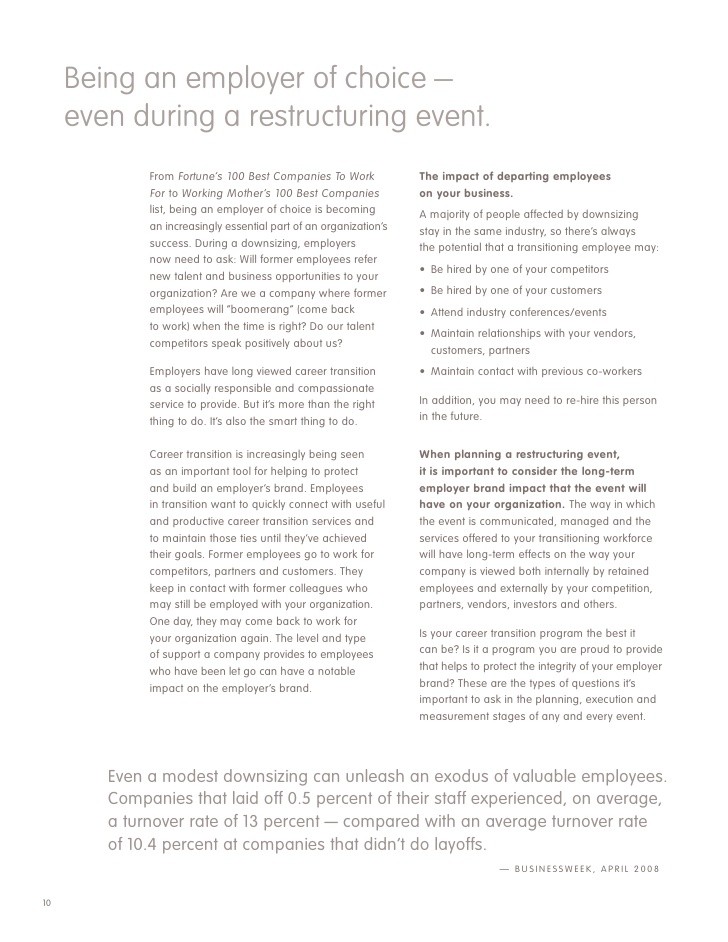Financial Impact of Career Change New Employer
Post on: 16 Март, 2015 No Comment

While switching jobs or careers may be exciting, its important to do your due diligence in order to maximize your financial benefit and to protect yourself. Even if the new position pays more, pay close attention on the compensation and benefit details to avoid surprises and ensure a smooth financial transition.
When you change jobs, important differences are likely to surface between retirement plans, health insurance and other programs at your old employer vs. your new employer. Navigating these differences is critical in getting the most out of your benefits and protecting long-term investments.
Here are some tips for taking the right actions before, during and after your career change:
Before your career change
In the weeks or months leading up to a career change, you can take steps to begin preparing for the transition ahead. Some things you can do to prepare:
- Make a plan — Evaluate your current assets, income and expenses, as well as the costs you will incur in making the career change. Will you have moving expenses? New clothing or tools to buy? Time gaps between the two jobs?
- Create a cushion — Add to your savings to cover transition costs. Often a new employee faces a delay of a few weeks before receiving a paycheck, so be sure you have a cushion.
- Check your vesting status — Your previous employer probably has vesting schedules for stock options, 401(k) matches, deferred compensation and similar benefit programs. If youre due to vest in a few months, you may want to put off a job change to avoid leaving money on the table. On the other hand, its good to know what vested benefits you can count on with your new employer.
- Watch your health benefits — Take a close look at your current health insurance (including dental and vision, if you have them) and your new employers plans, to be sure you wont face a gap in coverage when you switch jobs. It may even help you to go ahead and have exams or optional procedures before the job change, depending on the health plans.
As you research retirement benefits, reach out to an financial and investment advisor for assistance.
During your transition
The transition period tends to be a flurry of activity and you may be tempted to check any box when called upon, whether by your previous or new employers, when making decisions on benefits, stock options and other programs. But its important to pay attention because hasty decisions can have serious long-term impacts on your finances:
- Move retirement plans — A key decision is what to do with your 401(k) or other retirement plans. You can leave the assets in your previous employers plan, roll them over to the new employers plan, or roll them over to your own individual retirement account (IRA). A rollover IRA gives you control of investments and stays with you through future job changes. We strongly recommend rolling out of a 401(k) to better equip you to either control the investments yourself or have a financial advisor do it for you.
- Pick direct rollovers — Be sure to request a direct rollover from your previous employers plan to an eligible plan, known as a trustee-to-trustee transfer, to avoid being hit with taxes and penalties for a cash-out.
- Maintain insurance — Based on information you gather on insurance health, life and disability at your former employer and your new one, take steps to keep coverage in place. It may even be worth paying a few months premiums yourself if there is a gap in coverage.
- Learn the new system — Get to know the Human Resources, payroll and benefit offices at your new employer. Dont be shy about asking questions to understand the financial details and timing of your new compensation and benefits package.
- Prepare for taxes — Especially if your new career pays more than the old one, you may face higher taxes. Set aside savings for extra taxes, or discuss your payroll withholding with the payroll office to be sure you are withholding enough money. Also, make notes and keep receipts and other documentation of job-change costs that might be tax-deductible.
You may benefit from consulting a tax professional about the effects of the new career itself and changes in retirement plans.
After your job change
Once you get settled into your new position, turn your attention to what comes next. Be sure you are taking full advantage of the benefit plans available to you. Stay on top of the tax situation for this transition year. Consider using any raise in pay to bolster your savings or pay down debt.
Now is also a good time to update your financial plans for the long term, including investments and retirement accounts. Use our 401(k) Contribution Calculator to evaluate your various levels of contributions and realize the future value of your retirement accounts.
If you are rolling over assets to an IRA, work with a financial advisor to select appropriate investments and tactics such as low-cost mutual funds, making sure to diversify among different asset classes, and develop or restore an allocation that fits your goals and stage of life.
Consider holding a financial summit with your spouse and financial advisor. Go over the recent changes in your financial situation, evaluate the assets available for retirement and other life plans, and make adjustments as appropriate.
What to do next
- Make a financial plan for your career transition.
- Get details on benefit vesting and coverage.
- Roll over retirement accounts and maintain insurance.
- Review your long-term and retirement plans.














